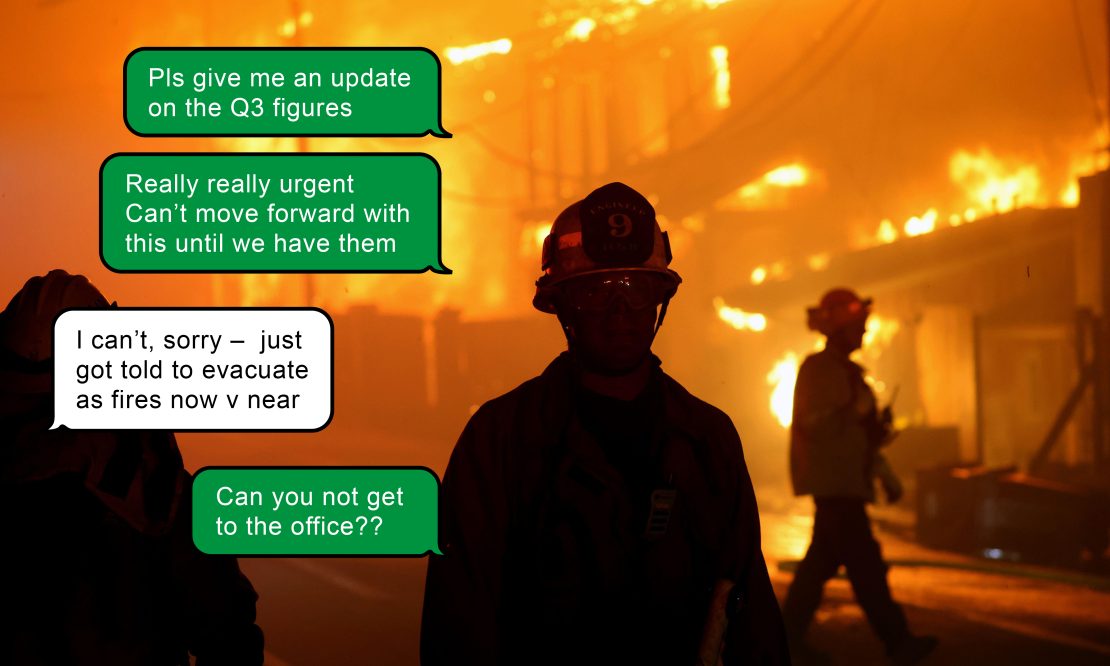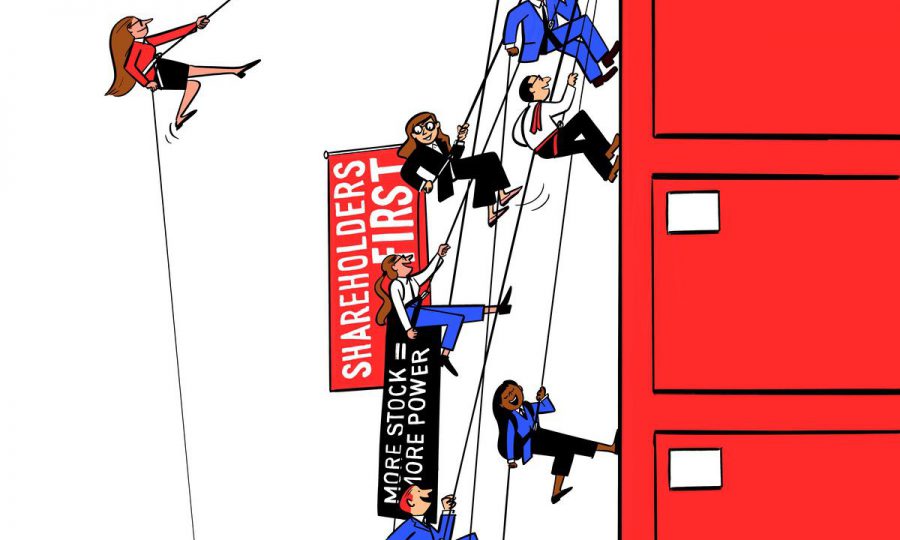I can’t make the meeting because the office is on fire
How exactly do you support your team and colleagues in the age of extreme weather events?

“Things go from zero to 100 in a matter of minutes,” says Misha Kouzeh (IBA, 2010). “When it gets to that point, nothing matters but helping yourself and each other.” She’s talking about her experience of the devastating wildfires that ravaged Los Angeles in January 2025 – the most recent of four such emergencies she’s had to contend with over the past decade.
“We had evacuation bags packed for days,” recalls Kouzeh, who is based in Porter Ranch, a suburb of Los Angeles. “We were constantly on alert, so I got used to looking around our home to work out what was important and what I’d take if I had to leave. I used an app called Watch Duty – which maps wildfires – to monitor the spread, and I’d text anyone I thought might have been affected to check they were OK and offer them a spare room if they needed one. I was really worried about a close friend who was at home with a newborn…”
Her story illustrates both the practical and emotional complexities involved in coping with an extreme-weather event. As well as protecting her own wellbeing and extending support to friends in need, Kouzeh had to continue doing her job throughout an immensely stressful period, often liaising remotely with colleagues outside California who had no idea of the gravity of her situation. “I would have loved to see a little more empathy from people in my workplace,” she says. “I just wanted everyone to appreciate that I was doing all I could to keep the company running – while knowing I could be displaced from my home at any minute.”
First responders
From wildfires in Los Angeles to floods in Valencia, cyclones in Brisbane to heatwaves in Greece, extreme weather is becoming a fact of life. Many companies are already thinking about how it might affect the bottom line, says nudge theory expert Dr Antonia Krefeld-Schwalb, an Assistant Professor at RSM. “Companies are now obliged to report all the climate risks they are facing within the European Union, and that has nudged many into thinking about questions such as how reliant they are on natural resources,” she says.
But people are the most vital of all those resources – and companies now need to anticipate and respond to the needs of employees in a sensitive way. “That could be encouraging employees to prepare better for hazardous events, such as by protecting their house or finding alternative ways to travel if public transport is disrupted,” says Krefeld-Schwalb.
Kouzeh agrees that a little thinking ahead can go a long way. “There’s a lot that can be done ahead of time,” she advises. “For example, leaders should assess their team’s vulnerability levels by looking at who lives in high-risk zones and what access they have to necessary resources – for instance, air purifiers to deal with smoke in the wake of a wildfire.”
Managers also need to be empowered to make quick decisions in unprecedented circumstances. “They could have the authority to offer flexibility around work hours, for example, or reassign work rather than asking someone who is anxious about their home being flooded or burned to join a conference call,” Kouzeh says. “And above all, colleagues need to focus on personal check-ins rather than productivity – because people will be going through an emotional rollercoaster.”
Support system
In fact, forward-thinking businesses should see preparedness and support as an opportunity to distinguish themselves from competitors, says Krefeld-Schwalb’s colleague and collaborator Dr Sebastian Gabel, Assistant Professor in the Department of Marketing Management. “Consider insurance packages: many companies now understand that it’s part of their institutional responsibility to support their employees. It’s a way for employers to show they’re not just there to extract labour, but also to support in a moment of crisis – and the trust they’ll gain from doing that is bound to be rewarded with loyalty. It’s a win-win.”
Even businesses that cannot afford to offer financial assistance can play a valuable mediating role, he adds, such as directing vulnerable team members towards sources of government funding or legal support. “By being good facilitators, companies can help individuals to feel less overwhelmed.”
But adapting to climate change isn’t just about crisis management; it’s also about evolving daily practices to mitigate the impact of day-to-day changes in weather patterns. “There’s a growing need to alleviate heat stress in cities around the world,” says Krefeld-Schwalb. “Given that we’re likely to be facing prolonged periods of heat, businesses must think more carefully about how they can help their employees stay cool and continue to work.” That might translate into measures such as making funds available for staff to purchase air-conditioning units to install in their own houses, in the same way that many departments set aside budget for home-office equipment during Covid-19 lockdown periods.
Real world impact
Of course, the most effective way to combat the effects of climate change is to minimise its occurrence in the first place. Denisa Kasa (MSc Business Information Management, 2023) knows the importance of collective action. She moved back to her native Albania after learning that the country is home to some of Europe’s most polluted rivers, and now organises river walks and clean-ups to bring locals face to face with the reality of what she describes as ‘ecocide’.
“It’s about uncovering the systemic nature of the problem, showing how both individual and corporate apathy can contribute to it, and then helping citizens understand how they can be part of the solution,” she says. “You can’t expect people to feel engaged when they’re sitting at a screen all the time. They have to spend time in nature.”
Iwan Zunder (MSc Entrepreneurship, 1999), a sustainability expert based on Curaçao, has a similar ambition to reverse or prevent ecological damage through the power of collaboration. He runs the SustainaBUL programme, supported by both the University of Curaçao and the private sector. It challenges young people to come up with concrete proposals to address problems such as rising sea levels – a very real threat on an island state. A coalition group comes together regularly to discuss ways that business can be done more sustainably – a step that Zunder sees as vital to achieving his goals. “If we’re talking about building a more sustainable world, I believe that corporates have to be the primary driving force,” he says. “They’re the ones with the resources, and they’re also where the younger generation look for examples.”
Collective action
What, then, should be the example that businesses set? “I think big companies need to take a multinational perspective on these issues,” says Krefeld-Schwalb. “Local expertise is essential: leaders need to focus on building the right infrastructure for different geographies and ensure there are people trained in how to handle challenges particular to their region.” Communication, on the other hand, should be global and transparent. “Imagine if you’re in Europe and collaborating with team members on the west coast of the US during a period of wildfires – currently, most companies don’t even have an unwritten rule for how to behave. We need proper procedures in place, agreed collectively with colleagues all over the world.”
Gabel agrees that a collaborative mindset is invaluable, whether that manifests itself in the form of a ‘buddy’ system pairing individuals within a single office or the establishment of partner offices across a global network. “By implementing support mechanisms systematically, the task of offering support in a crisis becomes less daunting,” he points out. Communicating success stories can help, too. “Talking about what has worked encourages individuals to take ownership in supporting their peers and colleagues, as well as making companies more willing to invest more in building resilience.”
We can’t predict the future but we can be better prepared for it, says Kouzeh. “I know we can’t say this won’t happen again,” she acknowledges. “But I want to be sure that if it does, I’ll have a plan in place and can trust that my company and community will come together to help. This is a time when seeing the bigger picture matters.”
Bring out the best in yourself and others
Leadership development is the key to transform your career and make a positive change. RSM leadership courses help you to develop the expertise needed with C-level skills attuned to a changing world.



